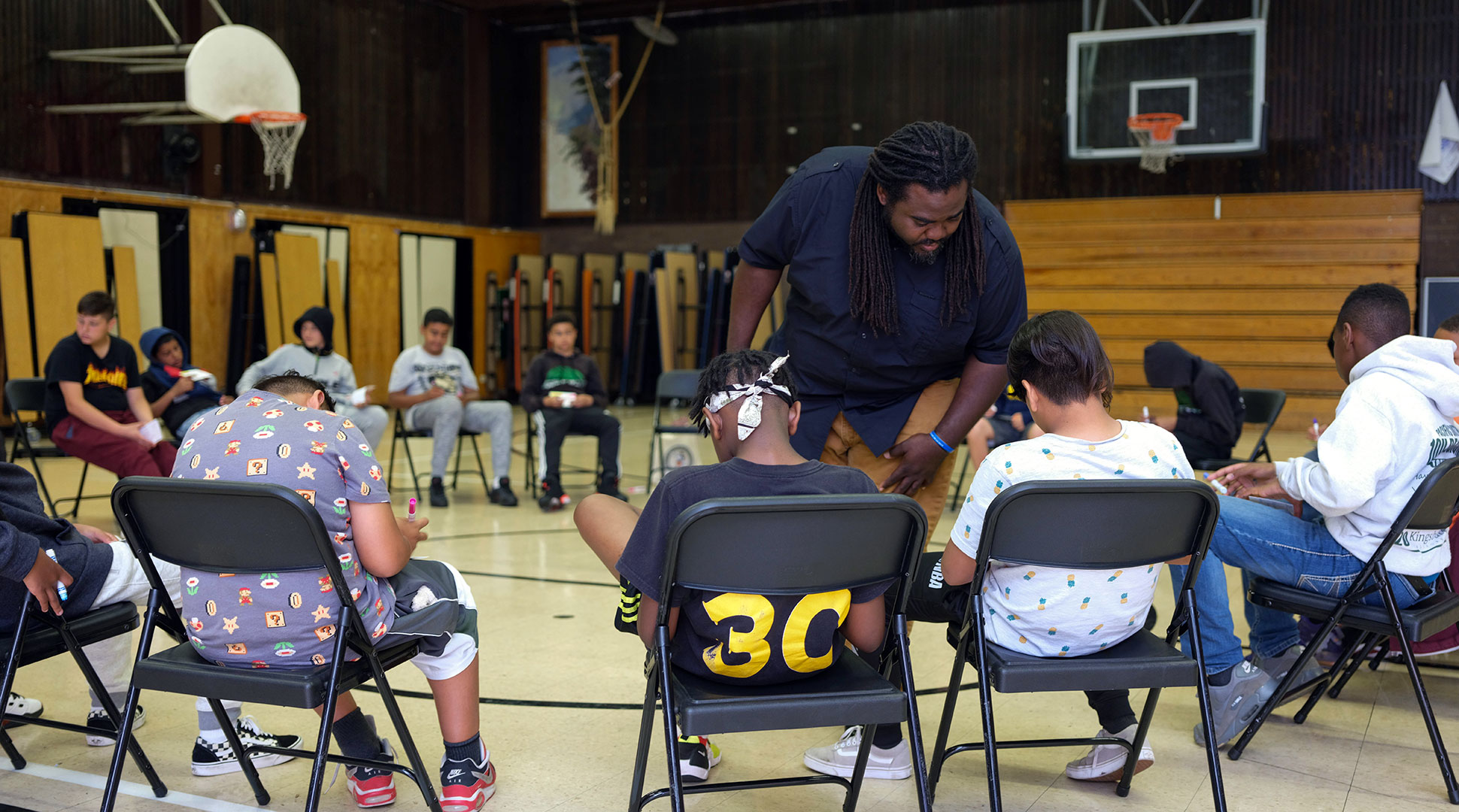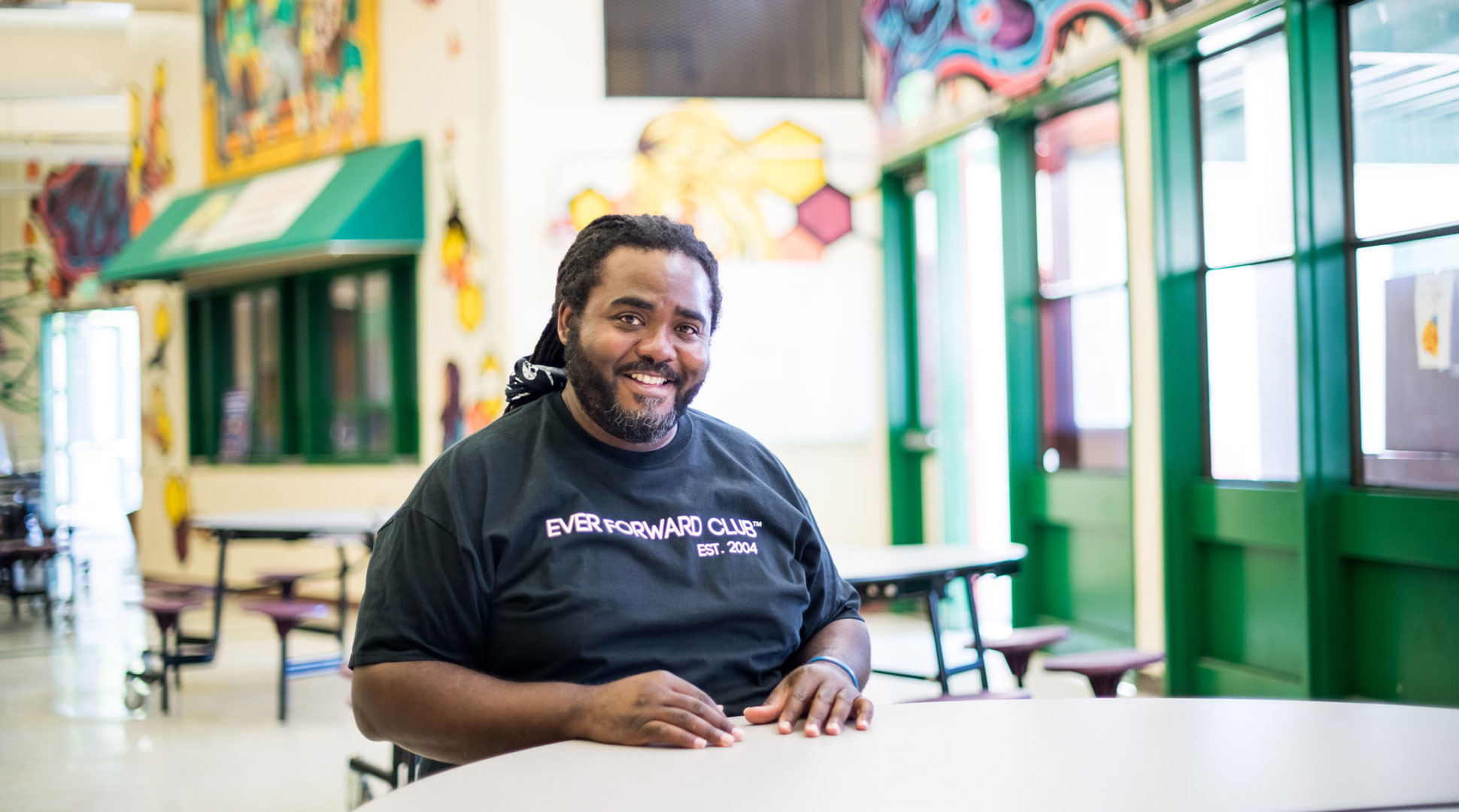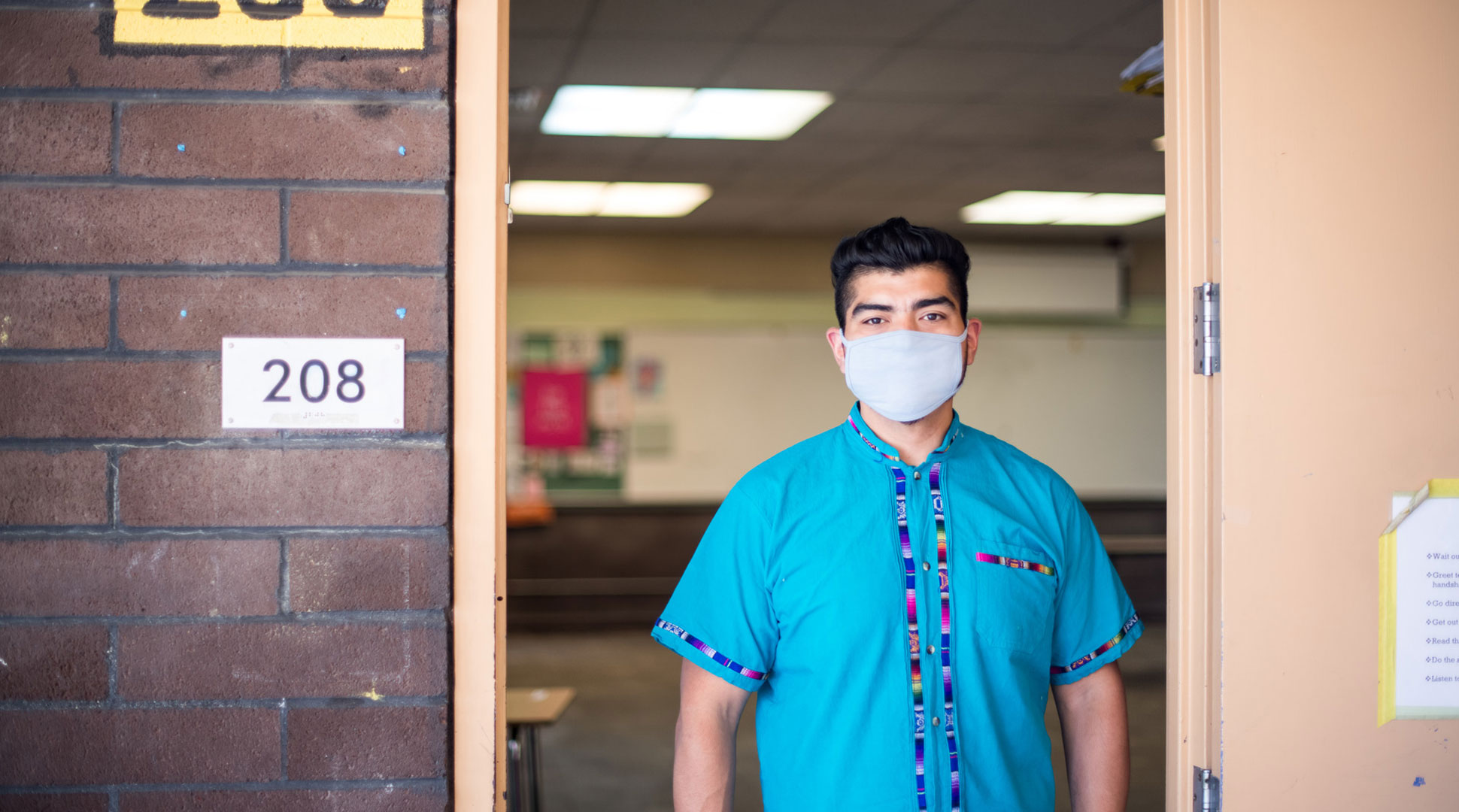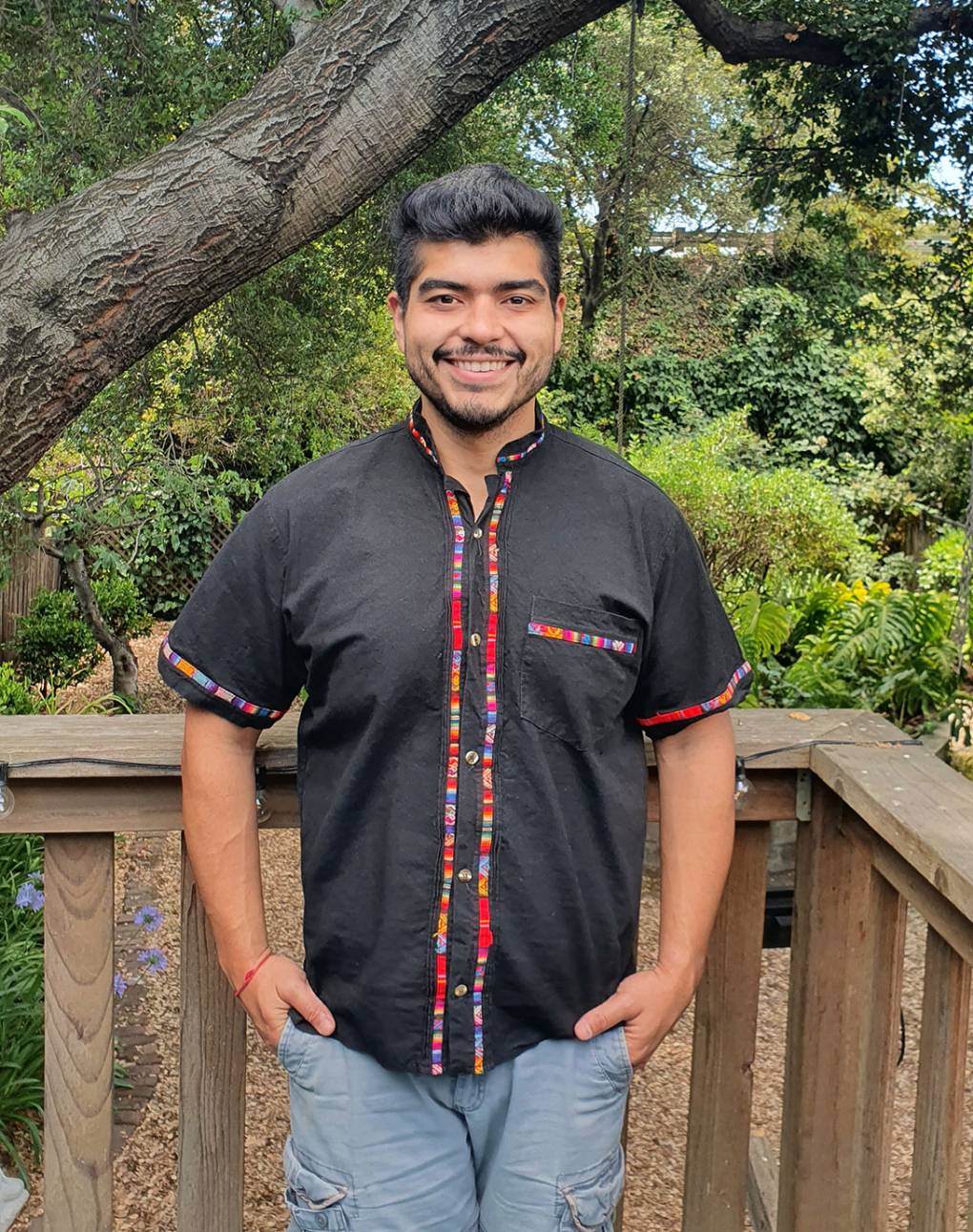How Learning Emotional Skills Can Help Boys Become Men
Author: Katrina Schwartz
Go to Source
Ashanti Branch was working as an engineer when a friend called him up to ask if he would volunteer a few hours on Saturday mornings to tutor students in math for the Upward Bound program at Mills College. Branch grew up in Oakland, attended its public schools, worked hard and went on to get a college degree from Cal Poly in San Luis Obispo, California. He figured it was time to give back a little, but he only committed to a few months. He surprised himself by taking his students’ academic progress personally.
“The fire started,” Branch said. “And I was trying to run from it. I was like, wait, teachers don’t make money. I don’t want to be no teacher.”
But he couldn’t outrun the calling to become a teacher, so he went back to school to earn his credential and started teaching math at San Lorenzo High School near Oakland. Right away he noticed that some students were not succeeding in his class, and they were mostly young men. So he invited a group of them to come to his classroom at lunch – he’d provide food – so they could tell him how to be a better teacher.

“And what they started talking about was, ‘I ain’t gonna be no nerd, no geek, no teacher’s pet.’ Everything about ‘smart’ to them was negative. And I realized my job was to build a space that was smart and cool.”
So Branch kept buying those students lunch, building a rapport with them, making them feel special, chosen. He saw a lot of himself in those students.
“What I realized they needed was what I needed in high school. I needed a space to just be human. And to be like, ‘I’m going through stuff, and I don’t get to talk about it, I just have to pretend everything is great. Everything is not. I’m struggling.’”
And just like that, without even meaning to do it, Branch started the Ever Forward Club. It became a place where students felt safe to reveal their weaknesses, ask for help, get support and be smart. Branch made them feel like they mattered. He set high expectations for students and provided academic support when they needed it. If he saw Ever Forward students in the hallways when they should be in class, he challenged them on it. When they skipped school, he’d show up at their homes to ask what was going on and ask if they needed anything. He wanted them to know they were missed.
“What I realized happens with a lot of teachers, and at schools in general, is that if the students are not doing what we expect them to do, sometimes the teacher will be like, ‘You have to fix what you’re not doing right.’ With no instruction on how to fix it. I was going to hold them to really high expectations. And I was gonna provide a high level of support for them.”
Branch created the first Ever Forward Club out of an empathetic understanding of what kids needed. He grew up in Oakland. His dad died before he was born and his mom raised Branch and his younger siblings on her own. As the oldest kid, Branch had a lot of responsibilities growing up, like watching his siblings, cooking meals and cleaning. Even at a young age, he knew it felt like a burden. But he never told his teachers that stuff. Instead, he bottled up his anger and sadness. He wondered what might have been different in his life if he’d had a space like the Ever Forward Club growing up.
What was instinct for Branch has increasingly been on the minds of education scholars, psychologists and educators. Schools now put more emphasis on the social and emotional needs of students, taking heed of decades of research showing that academic performance can’t be separated from overall wellness. Many schools try to create a similar sense of belonging through their advisory programs, and increasingly psychologists like Marc Brackett, the Director of the Yale Center on Emotional Intelligence, are talking about the importance of emotional intelligence.
“The really powerful emotions build up inside us, like a dark force that inevitably poisons everything we do, whether we like it or not. Hurt feelings don’t vanish on their own. They don’t heal themselves. If we don’t express our emotions, they pile up like a debt that will eventually come due,” Brackett writes in his book Permission to Feel: Unlocking the Power of Emotions to Help Our Kids, Ourselves, and Our Society Thrive.
Brackett and others make the simple case that most people aren’t good at identifying or dealing with their emotions, which adversely affects their academic and work performance, as well as their happiness. But adults and kids can learn tools to improve their emotional intelligence. This work is important for everyone, but Ashanti Branch witnessed firsthand that boys in his school often had the toughest time expressing emotion. They were battling against a culture telling them what men can and can’t do.
“They don’t have any emotional language,” Branch said. The two most common emotions he saw kids express were anger and humor – the hammer and the tickler, as he calls them. “[For] most of them, when the tickler doesn’t work, they pull out the hammer. Some of [them] are using hammers on things that need like a screwdriver. How do we help them learn to use more tools?”
Branch has experience dealing with student anger. In the process of holding them to high expectations – often riding them to get their work done, show up on time and meet their commitments – students directed their frustration and anger at him. He encouraged it by telling them not to ignore their feelings.

“‘Cuz I didn’t do it to make you mad. But it made you mad, or it made you upset, or sad or embarrassed,’ and I used those emotion words with them because they turn everything into anger,” he said. Branch said the boys he works with reach for anger because “in our community, where I live and a lot of them live, anger is respected by men.”
When Branch started to realize the unique trap these young men he cared about were in, he started looking for more resources. He joined several men’s groups including ones offered by The Mankind Project, Evryman and MDI. He realized he’d been looking for that kind of gender-specific space for a while – a place where he could share openly with other men about the unique challenges of being men in this world. He discovered the power men can reclaim when they are vulnerable and talk about what they are feeling. And he was surprised to find he could trust other men to hold him accountable to his commitments and goals out of care and respect. He realized that his intuition to push his students to acknowledge and talk about their feelings was more important than ever.
The Evolution of Ever Forward
Ashanti Branch taught in the classroom for 12 years, while running, supporting and fundraising for the Ever Forward Club on the side. But the crushing workload contributed to Branch having several serious panic attacks.
“I remember feeling so overwhelmed,” Branch said. “I didn’t know any better, but to give 100%.”
He wanted to have a more systemic impact, and he wanted the work to be sustainable for him, so he moved into school administration. After a few years, that didn’t seem right either, so Branch decided to start an official non-profit, Ever Forward/Siempre Adelante.
Ever Forward/Siempre Adelante works on three levels: It supports Ever Forward Clubs in schools, provides professional development to teachers and administrators interested in this kind of mentoring work, and creates outward facing opportunities for schools to engage in the work through efforts like the #100kMaskChallenge, a simple activity that can help adults learn more about what’s going on in the lives of their students.
Ever Forward at Academy of Alameda
Carlos Velazquez runs an Ever Forward Club at Academy of Alameda, in a city just outside of Oakland. Like Ashanti Branch, Velazquez experienced the power of men’s groups in his own life. He started attending a group at La Clinica de la Raza, in the Fruitvale neighborhood of Oakland, while trying to make some changes in his personal life.

He began to realize that he’d grown up with some toxic messages about what it means to be a man – treat women badly, don’t ask for help, do everything on your own – and those were adversely affecting his romantic relationships. As he began to unpack and dismantle the messages he’d been taught explicitly and implicitly about how to be a man, he also started wondering if he could help his students see a different way of doing things.
“I’m well aware that conditioning and socialization is super heavy,” Velazquez said. “These kids are getting messages of what it means to be a man constantly. And I know I’m going against that. And so for me, my hope for them is that seeds get planted that show them that, yes, there is another way for a man to be in this world.”
Velazquez’ school runs an advisory program. The Ever Forward Club fits into that structure. Velazquez meets with his group of about 20 middle school boys four times a week. One of those meetings always focuses on checking in and talking about how the boys are feeling. The other three meetings cover more traditional advisory activities like academic support and study skills.

“They can be pretty rowdy sometimes because they come in from whatever class they had before and they bring that energy,” Velazquez said about the students’ transition to the meetings. When COVID-19 forced schools to close, and students to shelter in place, the group met via Zoom.
The group starts most meetings by reciting the Inlakesh poem based on Mayan principals. Velazquez says the poem helps create “sacred space” in the group, drawing a line between what happened before the meeting, and the vulnerable space they will share together. It’s not easy. The boys often don’t open up right away. Velazquez has found that he has to model the vulnerability and language he hopes to see, and then often the boys will follow.
“The first time I remember that I felt safe to share in the group was when one of the boys shared something about their home life. Something they would never share in any circumstance,” said Angel, an eighth grader at the Academy of Alameda. “That was what first gave me a lot of trust in the group.”
Angel said he feels better knowing the boys in the group are there to support him because it’s hard to ask for help or talk about feelings in other parts of his life.
“People would think of you as weird or like too much for anyone else to handle,” Angel said. “It doesn’t feel too safe because you feel like other people are going to make fun of you.”
It can be hard to know if the Ever Forward Club is having much of an effect. Velazquez says his boys still get in fights; they still struggle in school sometimes; they still mess up. But he gets glimpses that it’s working. For example, a math teacher told him that three boys from his group stood out to her because of the way they collaborated productively in her class. Or, when Velazquez asks for help supporting a group member who is struggling, all the boys will volunteer. Those are the moments that give him hope.
The Future of Ever Forward/Siempre Adelante
Ashanti Branch has spent the last several years trying to convince other schools that this work is worth investment. It has been an uphill battle. Schools have limited budgets and many competing priorities – especially now that the coronavirus has decimated the funds states have to allocate for education, while at the same time requiring expensive changes to staffing and facilities.
But even before the global pandemic upended how schools operate, Branch found many educators and administrators resistant to his message. Some didn’t believe boys need gender-specific support, others didn’t have enough male teachers – and especially not male teachers of color – to support the work. Meanwhile, national data shows over 70% of emotional disturbance diagnoses are for boys.
“Every school is different,” Branch said, “But a lot of schools I go to, when we look at their suspension data, their attendance data, their referral data, young men are usually the highest number. Not every school, but a lot of schools. So why is it we don’t put money aside for a young men intervention program?”
The challenges of creating spaces like Ever Forward Clubs at schools intersect with so many other thorny issues in education: teacher shortages, faculty diversity, lack of funding, overburdened teachers and administrators, parental support and lack of time, to name just a few.
Branch understands all these challenges – he lived them in school buildings for more than a decade – but he has also seen how boys blossom when they have a safe space to get academic and emotional support. All the boys in the first Ever Forward Club graduated high school. Kids were clamoring to join, and Branch eventually started a separate group for young women who demanded something similar.
“Our young men are humans and they have big hearts,” Branch said. “But they’ve been taught to shut them down. And that’s the scariest thing I see.”
Ever Forward/Siempre Adelante is now thinking creatively about how to make the biggest impact. In the 2020 school year Branch started a program for students to start Ever Forward Clubs at their schools. He’s considered partnering with community organizations to run clubs, hoping to find more consistency in funding and staffing there.
He said his work started with boys of color because that was who he taught, but the longer he does this work, the more he realizes students and teachers are all wearing masks of different kinds. Everyone can benefit from this work.
He thinks we’d all be better off if we start acknowledging the difference between what we present and what we’re really feeling. And make space to talk about it.
